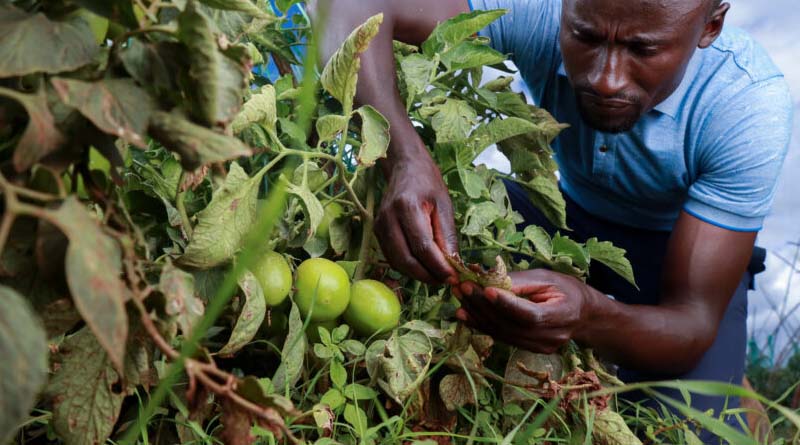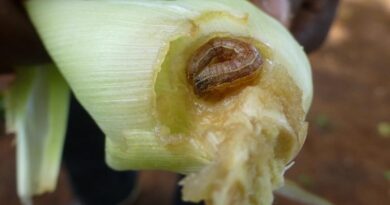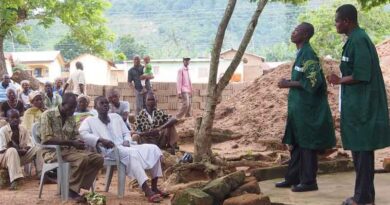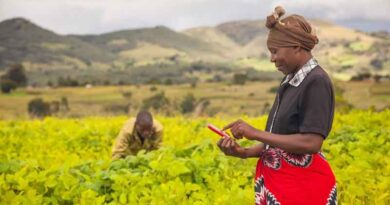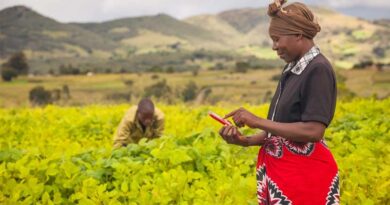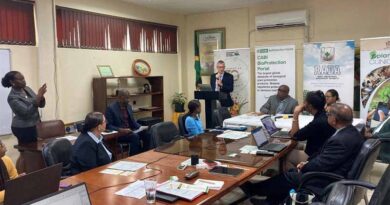Early pest warnings and IPM advice are improving food security for maize farmers in Ghana
15 November 2023, Ghana: Pest warnings are changing the way that smallholders in Ghana farm. Smallholder maize farmers in Ghana have long grappled with the challenges posed by crop pests. Over the past few years, this has included the notorious fall armyworm. This voracious invader has, in the past, led to significant crop losses. And the losses have impacted both food security and livelihoods in rural communities.
However, a recent study led by CABI has shown an interesting development. Early warning pest alerts reap benefits when coupled with Integrated Pest Management (IPM) advice. And they can make a substantial difference to farmers’ livelihoods and food security.
See the full paper here, published in the journal Food Security.
The alerts are broadcasted through community information centres or sent via mobile phone as text messages to farmers. They include IPM advice, which helps smallholders to boost crop yields by using a holistic approach. IPM combines various techniques, including biological control, monitoring and reduced pesticide use. The approach helps farmers manage pests more effectively while minimizing damage to crops. This results in increased yields. Plus, the techniques are more sustainable. They are better for human and environmental health.
The power of satellite technology for early pest warnings
The link between space-based technology and pest warnings might not be obvious at first. But information gathered by satellite is helping farmers better prepare for pest outbreaks.
In Africa, invasive pests, pathogens and weeds cost agriculture a staggering $65.58 billion annually. In 2016, CABI initiated the Pest Risk Information Service (PRISE) to tackle these challenges. The initiative was launched in collaboration with a number of international partners. It is partly funded by the PlantwisePlus programme. PRISE leverages several approaches and technologies. These include earth observation technology, satellite data, pest life cycles and real-time field observations. When harnessed, the information gathered by the service delivers early warnings about crop pests to farmers. This empowers farmers to implement IPM plans that can help limit potential yield losses.
The alerts help farmers address some of Africa’s most damaging crop pests. The fall armyworm, for example, is a significant threat to maize crops. It contributes to an average loss of 27% in Ghana. During the 2021 agricultural season, pest alerts were beneficial. PRISE used a combination of data, modelling and observation to forecast the risk of fall armyworm outbreaks. These alerts were then transmitted to farmers. They received them through Community Information Centres (CICs) and voice short message service (SMS).
The evidence and impact of pest warning information
Research into PRISE is now revealing the impact these alerts have had on farmer food security. In 2021-22, CABI conducted a study in Ghana’s major maize-growing regions of Bono and Bono East. It involved 888 farm households operating 1,305 maize fields. These smallholder farmers were provided with pest risk information obtained from satellite technology. The results gave positive results. Those who received this information experienced an average gain of 4% in their maize yields. Furthermore, they were also 33% less likely to report experiencing hunger. This is a crucial indicator of food security.
The findings of the research imply some interesting results. Early warning pest alerts, together with actionable IPM information, are a win-win. They can contribute to the adoption of sustainable crop protection technologies. And they can improve the standard of living of farming households in Ghana.
Including women in pest alert services
Moreover, the study revealed a notable trend. When women received the pest risk information, positive outcomes were more likely. This is in comparison to when the information was solely directed at men. The positive outcomes were evident when women were either alone or together with their spouses. This insight underscores an important finding. Ensuring that information reaches all stakeholders in farming households – especially women – is beneficial.
A brighter future for smallholder farmers
The study’s lead author is Dr. Justice Tambo, a Senior Socio-Economist at CABI. He underscored how the gains from pest risk information are significant. However, they are not limited to increasing yields and reducing hunger. The reduction in pesticide use was less substantial than expected. Neither were improvements in household dietary diversity. However, the positive impact on food security was undeniable.
Dr. Tambo talked about how the study’s objectives were not nutrition-related. However, any positive indirect effect on dietary quality or nutrition outcomes is important. This is particularly pertinent given the alarming levels of malnutrition among rural populations.
Could pest warnings pave the way to nutrition-sensitive agriculture?
The findings of this study open the door to a broader perspective on agricultural interventions. Early warning pest alerts and IPM can increase yields and reduce hunger. But they can also be leveraged to promote nutrition-sensitive agriculture. Integrating nutrition education into pest-related campaign messages is beneficial. These interventions can contribute to better diets and, ultimately, healthier rural populations.
This research underscores the potential for well-informed, technology-driven interventions. They can transform the lives of smallholder farmers. In Ghana and beyond, early pest warnings and IPM advice are transformational. They have the power to enhance food security and reduce hunger. They can lay the foundation for more resilient and prosperous farming communities. We continue to face agricultural challenges in an ever-changing world. Climate change impacts rural communities across the globe. But the data-driven knowledge sharing offers hope and practical solutions for the future.
Also Read: Boosting Millet Production: ICRISAT Joins Forces with the Assam Millet Mission
(For Latest Agriculture News & Updates, follow Krishak Jagat on Google News)

